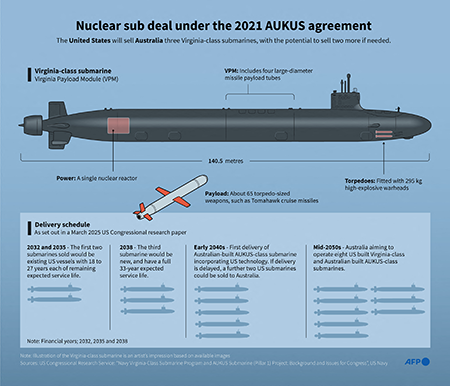"I find hope in the work of long-established groups such as the Arms Control Association...[and] I find hope in younger anti-nuclear activists and the movement around the world to formally ban the bomb."
House Committee Strengthens AUKUS, Weakens Arms Oversight
September 2025
By Lipi Shetty
The U.S. House Committee on Foreign Affairs approved six bills July 22 aimed at loosening controls on arms exports through amendments to the Arms Export Control Act or the process by which it is implemented in the interagency export control process.

On a party-line vote of 27 to 23, the committee approved H.R. 3613, the Streamlining Foreign Military Sales Act of 2025, which increases the dollar thresholds that foreign arms sales must reach before they trigger congressional notification requirements.
The bill doubles the threshold for non-NATO, non-Five Eyes countries from $14 million to $30 million, and nearly quadruples the thresholds for NATO and Five Eyes countries from $25 million to $105 million. The Five Eyes countries—Australia, Canada, New Zealand, the United Kingdom, and the United States—have a special commitment to share the most sensitive intelligence.
The bill goes beyond the change requested by the Trump administration in an Apr. 7 letter to Congress. Signed by Secretary of State Marco Rubio and Defense Secretary Pete Hegseth, the letter asked Congress to raise the current $25 million threshold for NATO allies to $55 million or more, Politico reported. The letter and bill follow Trump’s Apr. 9 executive order that eliminated certain agency regulations to expedite foreign arms sales. (See ACT, April 2025.)
“This bill represents one of the largest rollbacks of congressional oversight on arms sales in the last 50 years,” said Colby Goodman, a senior researcher with Transparency International U.S.
Goodman said the bill would not accelerate arms sales because “bureaucratic holdups [in the arms sales process] stem largely from within the Executive Branch, not from Congress.”
Also on a party-line vote, the committee cleared H.R. 3068, a bill to promote the AUKUS defense agreement among Australia, the UK and the United States. The bill, which passed 26 to 24, was sponsored by Rep. Bill Huizenga (R-Mich.) and co-sponsored by Rep. Michael McCaul (R-Texas), a co-chair of the Congressional Friends of Australia Caucus.
The bill modifies provisions of the Arms Export Control Act to permit the government to exempt rockets and unmanned aerial vehicles with a range of over 300 kilometers and capable of carrying over 500 kilograms of payload from licensing requirements through binding bilateral agreements.
The AUKUS agreement envisions the joint development of hypersonic missiles under “Pillar 2” of the trilateral defense partnership.
“By modernizing the Missile Technology Control Regime to meet the security challenges of today, we can strengthen our defense capabilities and increase our cooperation with our allies, especially Australia and the United Kingdom,” said Huizenga. H.R. 3068 “can act as a force multiplier that allows the United States and our closest allies to address the security challenges we face today and in the future.”
Three other bills about the arms trade passed the committee on a largely bipartisan basis. These included measures to modify previous legislation creating an expedited review process for AUKUS-related export licenses, to direct a review of the foreign military sales list, and to direct a prioritization of customers for direct commercial sales. A final bill, accelerating arms sales to countries in the Middle East and North Africa that recognize Israel and oppose Iran, passed the committee with a mix of Republican and Democratic votes.
